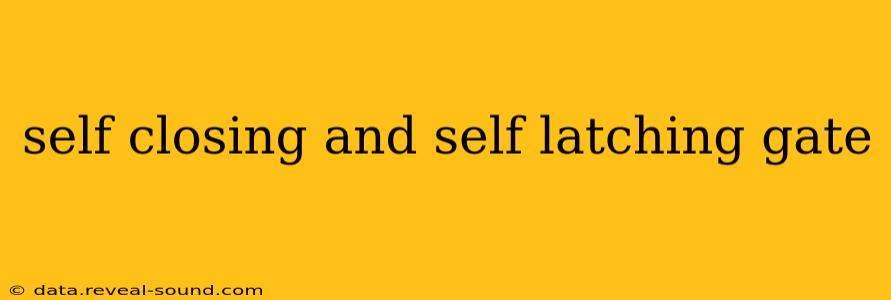Choosing the right gate for your property involves considering safety, security, and convenience. Self-closing and self-latching gates offer a significant upgrade in these areas, enhancing both residential and commercial environments. This comprehensive guide explores the differences, benefits, and considerations involved in selecting the perfect self-closing and self-latching gate for your needs.
What is a Self-Closing Gate?
A self-closing gate is designed to automatically return to its closed position after being opened. This feature is crucial for safety, ensuring the gate doesn't remain open, posing a potential hazard for children or pets. The closing mechanism can utilize various methods, including spring-loaded hinges, hydraulic closers, or even gravity, depending on the gate's design and weight.
What is a Self-Latching Gate?
A self-latching gate automatically secures itself in the closed position. This eliminates the need to manually latch the gate, improving convenience and reinforcing security. The latching mechanism usually engages automatically as the gate closes, providing a secure barrier.
What is the Difference Between a Self-Closing and a Self-Latching Gate?
While often used together, self-closing and self-latching are distinct features. A self-closing gate ensures the gate closes, while a self-latching gate ensures it remains securely closed. You can have a gate that is self-closing but not self-latching (requiring manual latching), a gate that is self-latching but not self-closing (requiring manual closing), or, ideally, a gate that offers both features for optimal safety and convenience.
What are the Benefits of Self-Closing and Self-Latching Gates?
The combined benefits of self-closing and self-latching gates are substantial:
- Enhanced Safety: Preventing accidental openings minimizes the risk of children or pets wandering off or encountering hazards.
- Improved Security: A self-latching gate provides a deterrent to intruders and unauthorized access.
- Increased Convenience: No need to manually close and latch the gate every time, saving time and effort.
- Reduced Maintenance: The automatic closure reduces wear and tear on the gate and hinges compared to constantly manual opening and closing.
What Types of Self-Closing and Self-Latching Mechanisms Exist?
Several mechanisms achieve self-closing and self-latching functionality:
- Spring-loaded Hinges: These hinges utilize springs to provide the closing force. They're suitable for lighter gates.
- Hydraulic Closers: These are more robust and adjustable, offering controlled closing speeds, particularly beneficial for heavier gates.
- Gravity: Heavier gates can sometimes rely on gravity alone for self-closing, but this often requires careful design and consideration of terrain.
- Magnetic Latches: These provide a secure and quiet latching mechanism, often used in conjunction with other self-closing mechanisms.
How Much Do Self-Closing and Self-Latching Gates Cost?
The cost varies greatly depending on the gate's material (wood, metal, vinyl), size, design, and the type of self-closing and latching mechanism used. Simpler gates with basic spring mechanisms will be less expensive, while larger, more complex gates with hydraulic closers and advanced latching systems will be significantly more costly.
Where Can I Buy Self-Closing and Self-Latching Gates?
Self-closing and self-latching gates can be purchased from various retailers, including home improvement stores, fencing companies, and online suppliers. It's crucial to select a reputable supplier to ensure quality and proper installation.
How Do I Install a Self-Closing and Self-Latching Gate?
Installing a self-closing and self-latching gate can be a DIY project for some, but it often requires specific skills and tools. For complex gates or those with advanced mechanisms, professional installation is recommended to ensure proper functionality and safety. Incorrect installation can compromise the gate's effectiveness and even create safety hazards.
Are Self-Closing and Self-Latching Gates Required by Building Codes?
Building codes often address gate safety, especially in areas concerning children's access and pool safety. While not universally mandatory for all gates, self-closing and self-latching features are frequently recommended or required by local building codes, particularly for gates surrounding pools or other hazardous areas. Always check your local building codes and regulations before installation.
This guide provides a comprehensive overview of self-closing and self-latching gates. Remember to prioritize safety and consult with professionals when necessary to ensure proper installation and functionality.
